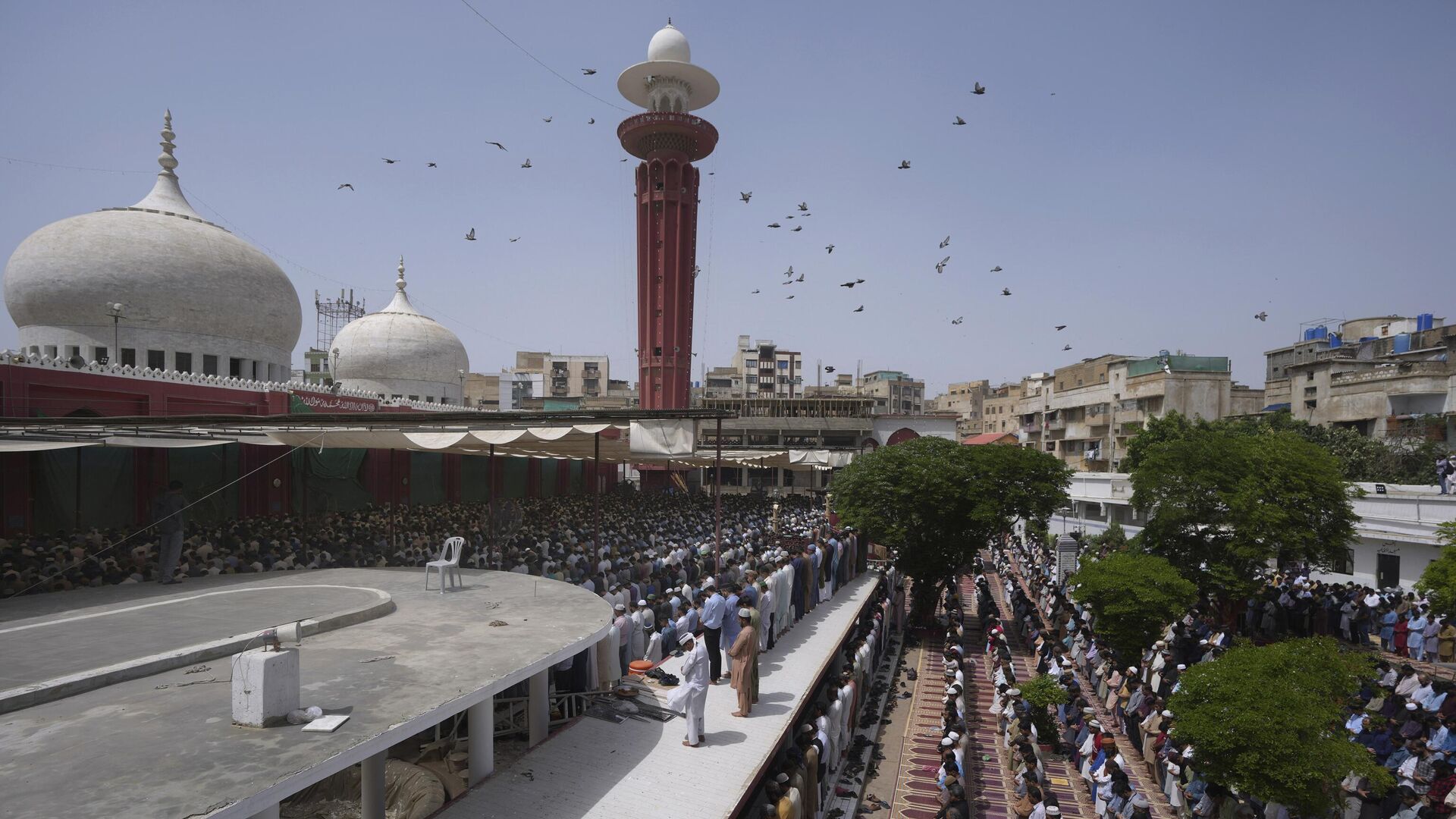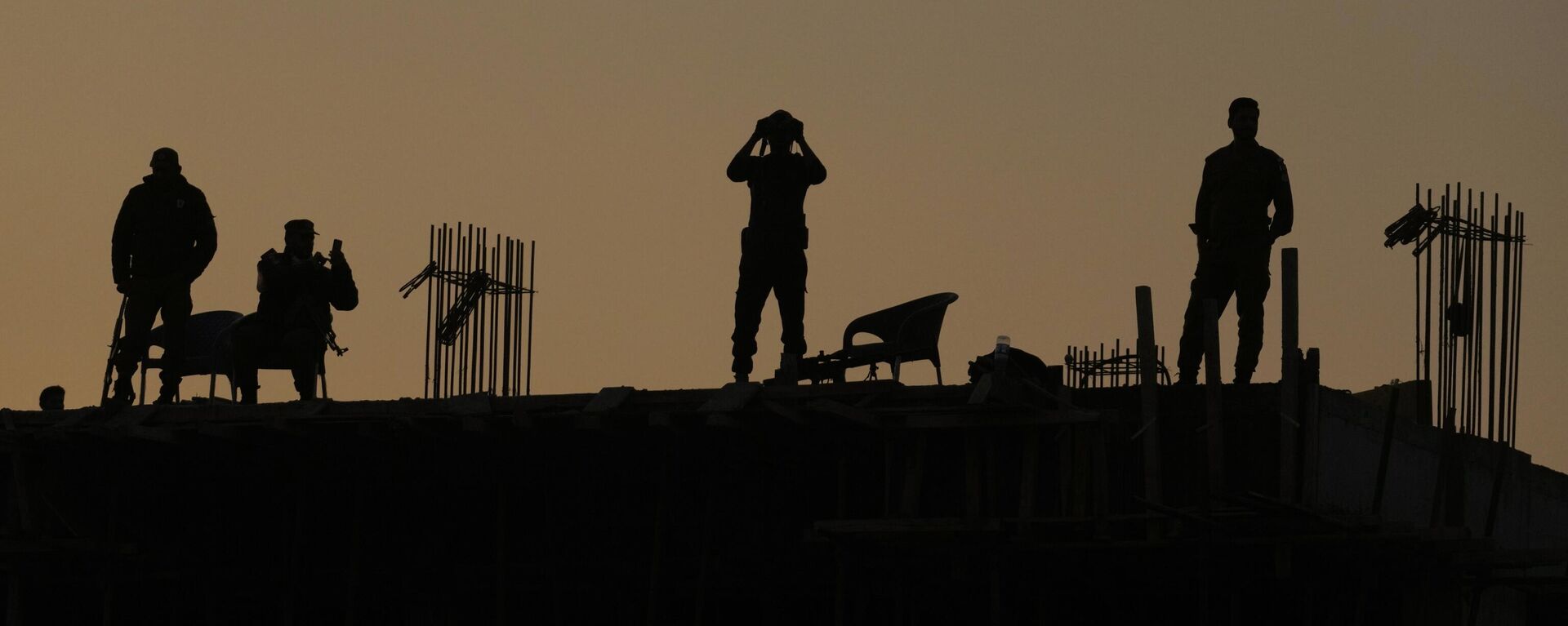https://sputniknews.in/20230331/a-month-of-mercy-pakistanis-embrace-ramadan-amid-unimaginable-food-inflation-1383932.html
'A Month of Mercy': Pakistanis Embrace Ramadan Amid Unimaginable Food Inflation
'A Month of Mercy': Pakistanis Embrace Ramadan Amid Unimaginable Food Inflation
Sputnik India
Ramadan has always been a special occasion in Pakistan, but this year due to the economic slump and skyrocketing prices, the month is turning out to be tough... 31.03.2023, Sputnik India
2023-03-31T17:29+0530
2023-03-31T17:29+0530
2023-03-31T17:38+0530
sputnik exclusives
pakistan
south asia
imf loan
ramadan
economic crisis
https://cdn1.img.sputniknews.in/img/07e7/03/18/1294395_0:0:3073:1728_1920x0_80_0_0_998bcb199f70f8b65fa88dd04e5130f1.jpg
During Ramadan, after over 12 hours of fasting, people like to enjoy lavish iftar meals (an iftar is a meal eaten at sunset to break the fast) which include fruit, meat dishes, bakery items, sweet drinks and tea. Unfortunately for many people in Pakistan, mediocre wages and unprecedented inflation means limiting their food purchases this year.Sputnik got in touch with a residential cook, Sher Ali, who shared how he and his wife are spending this Ramadan working full time in order to make ends meet.He shared that last Ramadan the family for whom he works used to eat 5-6 different dishes for iftar, often inviting relatives and friends over, but this year the number of dishes has gone down to just three.It comes as no surprise that even the upper middle class families are changing their lifestyle and Ramadan habits. Just last week it was reported that cooking gas and wheat flour have more than doubled in price over the past year, meanwhile onions shot up an eye-watering 228%.For the low income families such as Sher Ali's, Ramadan is a godsend because it’s when Pakistanis give generously to those less fortunate than themselves, as the zakat tax – a religious obligation for practicing Muslims is deducted from the savings accounts of those who can afford it.In a conversation with Sputnik, retired Defense Attaché Khalid Mahmood said that this month, he and his wife are organizing ration packs for charity distribution.According to Khalid he has bought ten small and ten big ration bags and plans to distribute them over the weekend. Talking about who will receive these ration bags, the retired bureaucrat said that there is a small mosque not far from his house; he will drop about ten bags off at the mosque so that the Iman can distribute it among the families in need.Another resident of Lahore, Hina Jawad is organizing food donations to an orphanage. She told Sputnik that the month of Ramadan is a month of mercy.In order to feed those in need, many NGOs across Pakistan are also organizing Ramadan ration drives, but the high prices for food items are pushing NGOs to the brink. Siddique Welfare Foundation recently reached out to the public on its social media account asking those who can to contribute to their cause and donate money, so that the NGO can buy food packets for people who are fighting hunger.Meanwhile, the government has also been organizing the distribution of basic food items such as flour, sugar and oil to the public across all the major cities. People's desperation to get their hands on the food has resulted in incidents of injuries and even death.Just last week, the distribution of free flour took two lives, while eight people were injured in Bannu, Khyber Pakhtoon region. The provincial administration was delivering free flour to hundreds of families in the Bannu Sports Complex when a stampede happened in the waiting queues. An elderly man and a woman lost their lives, while several people fell unconscious from the chaos. They were later taken to a district hospital.Although the responsibility lies with the government to ensure the availability of edible items at cheaper rates, it's difficult to expect any special initiatives to bring price relief, as the government continues to remain engaged in political and economic chaos and hopes for approval of an International Monetary Fund loan (IMF).At present, it seems like Pakistan's government is not in any position to offer any huge subsidies or duty/taxes relaxations to lower prices, hence, it is in the hands of the average Pakistani to help his less fortunate brothers and sisters.
https://sputniknews.in/20230329/pakistan-taken-off-eus-money-laundering--terror-financing-list-1357934.html
pakistan
south asia
Sputnik India
feedback.hindi@sputniknews.com
+74956456601
MIA „Rossiya Segodnya“
2023
Aneela Rashid
https://cdn1.img.sputniknews.in/img/07e6/0c/0d/74548_0:0:485:484_100x100_80_0_0_821526e967ae85d041e2d30ee34fa1de.jpg
Aneela Rashid
https://cdn1.img.sputniknews.in/img/07e6/0c/0d/74548_0:0:485:484_100x100_80_0_0_821526e967ae85d041e2d30ee34fa1de.jpg
News
en_IN
Sputnik India
feedback.hindi@sputniknews.com
+74956456601
MIA „Rossiya Segodnya“
Sputnik India
feedback.hindi@sputniknews.com
+74956456601
MIA „Rossiya Segodnya“
Aneela Rashid
https://cdn1.img.sputniknews.in/img/07e6/0c/0d/74548_0:0:485:484_100x100_80_0_0_821526e967ae85d041e2d30ee34fa1de.jpg
pakistan, south asia, imf loan, ramadan, economic crisis
pakistan, south asia, imf loan, ramadan, economic crisis
'A Month of Mercy': Pakistanis Embrace Ramadan Amid Unimaginable Food Inflation
17:29 31.03.2023 (Updated: 17:38 31.03.2023) Ramadan has always been a special occasion in Pakistan, but this year due to the economic slump and skyrocketing prices, the month is turning out to be tough for many. Sputnik takes a look at how some residents of Lahore are managing to deal with the situation.
During Ramadan, after over 12 hours of fasting, people like to enjoy lavish iftar meals (an iftar is a meal eaten at sunset to break the fast) which include fruit, meat dishes, bakery items, sweet drinks and tea. Unfortunately for many people in Pakistan, mediocre wages and unprecedented inflation means limiting their food purchases this year.
Sputnik got in touch with a residential cook, Sher Ali, who shared how he and his wife are spending this Ramadan working full time in order to make ends meet.
"Last Ramadan my wife took time off from work to focus on fasting and praying because it is quite tough to fast and work full day, but this year we can't afford any time off. The price of petrol, rent and groceries since last Ramadan has become so high, that is why this year we both have to work full time,” Ali said.
He shared that last Ramadan the family for whom he works used to eat 5-6 different dishes for iftar, often inviting relatives and friends over, but this year the number of dishes has gone down to just three.
"I have also been instructed to cook chicken just once a week and we haven't bought any meat in weeks now. Mostly I cook spiced mixed vegetable dishes, various lentils with rice and for iftar I make pakoras (vegetable gram fritters) and a fruit chaat," the cook said.
It comes as no surprise that even the upper middle class families are changing their lifestyle and Ramadan habits. Just last week it was reported that cooking gas and wheat flour have more than doubled in price over the past year, meanwhile onions shot up an eye-watering 228%.
For the low income families such as Sher Ali's, Ramadan is a godsend because it’s when Pakistanis give generously to those less fortunate than themselves, as the zakat tax – a religious obligation for practicing Muslims is deducted from the savings accounts of those who can afford it.
In a conversation with Sputnik, retired Defense Attaché Khalid Mahmood said that this month, he and his wife are organizing ration packs for charity distribution.
"I am purchasing two types of ration packs this Ramadan to distribute: a small bag costs Rs 4,000 ($14) and carries flour, sugar, rice, pulses, tea, salt, oil and ghee, gram and vermicelli. The bigger ration bag costs Rs 6,000 ($21) and has a larger quantity of products."
According to Khalid he has bought ten small and ten big ration bags and plans to distribute them over the weekend. Talking about who will receive these ration bags, the retired bureaucrat said that there is a small mosque not far from his house; he will drop about ten bags off at the mosque so that the Iman can distribute it among the families in need.
The other ten bags will be distributed in Khalid's neighborhood. "Our servant will take it to the neighboring homes and give it to their servants. We also have several security guards that work in our community compound, so I want to give about 3-4 bags to those hard working chaps, because groceries have become expensive and we must help those closest to us," Mahmood explained.
Another resident of Lahore, Hina Jawad is organizing food donations to an orphanage. She told Sputnik that the month of Ramadan is a month of mercy.
"When you fast from sunrise to sunset and you feel hungry and thirsty, you realize that there are so many people who feel this way all the time and not just during Ramadan. So it becomes important to help them and we as human beings and as Pakistanis must do what we can to ease struggles of the less fortunate ones,” Hina said.
In order to feed those in need, many NGOs across Pakistan are also organizing Ramadan ration drives, but the high prices for food items are pushing NGOs to the brink. Siddique Welfare Foundation recently reached out to the public on its social media account asking those who can to contribute to their cause and donate money, so that the NGO can buy food packets for people who are fighting hunger.
Meanwhile, the government has also been organizing the distribution of basic food items such as flour, sugar and oil to the public across all the major cities. People's desperation to get their hands on the food has resulted in incidents of injuries and even death.
Just last week, the distribution of free flour took two lives, while eight people were injured in Bannu, Khyber Pakhtoon region. The provincial administration was delivering free flour to hundreds of families in the Bannu Sports Complex when a stampede happened in the waiting queues. An elderly man and a woman lost their lives, while several people fell unconscious from the chaos. They were later taken to a district hospital.
Although the responsibility lies with the government to ensure the availability of edible items at cheaper rates, it's difficult to expect any special initiatives to bring price relief, as the government continues to remain engaged in political and economic chaos and hopes for approval of an International Monetary Fund loan (IMF).
At present, it seems like Pakistan's government is not in any position to offer any huge subsidies or duty/taxes relaxations to lower prices, hence, it is in the hands of the average Pakistani to help his less fortunate brothers and sisters.



